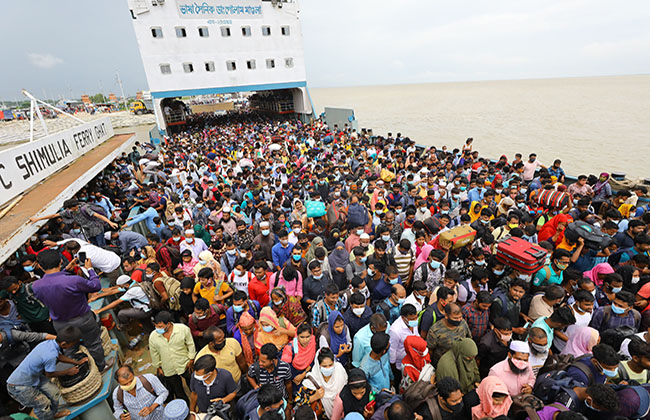
Mina was born and brought up in a remote village of Bangladesh. Like most of the girls in the village, she also got married before she turned twenty, and she couldn’t finish her school education. She became a mother of a son soon after her marriage. After a few years into the marriage, she had to take all the responsibilities of her son and herself, because her husband got addicted in gambling. Their marriage failed. Finding no ways of earning money in the village for her family, she decided to come to the capital city Dhaka, leaving her son with her mother in the village. First she joined a garment factory with the help of her relatives, who also work in Dhaka. But after some months, she quit the job as she could not work for so long hours standing all the time. Then she started working as a domestic worker. Since then she has been working as a domestic helper.Mina, who now works in the house of Aparna, a school teacher,shares some of her stories with her. She works in five houses, and earns Tk14,000 ($126.82) per month now.The wage rate for domestic workersin Dhaka city is as follows -for doing one task, it isTk1,000;suppose, for washing dishes it is Tk1,000, for cleaning the floor of a house Tk1,000, for washing clothes Tk1,000. So, to earn Tk14,000 per month, Mina has to do 14 such strenuous tasksevery day. In Dhaka, she lives in a single tin-shed room in a slum.She has to pay Tk4,000 as the room rent. So Tk10,000 remain. Now amid the skyrocketing prices of essentials, a person has to spend at least Tk4,000 for three meals a day.Today Aparna bought two cauliflowers.Seeing the vegetables, Mina told her, “It’s so costly apa. Today I wanted to buy a cauliflower, but after knowing the price of it, I didn’t buy it. One small size cauliflower costs Tk40. I eat potatomost of the time.”
Now back to the calculation –Tk4,000 for room rent and Tk4,000 for three meals a day. So Tk6,000 remain now. For some other essentials, she spends Tk1,000. She sends the remaining Tk5,000 ($45.29) to the village per month for her son and mother, who solely depend on her earning. Note that her medical expenses have been excluded here.No pension, no savings,she can survive as long as she can work so hard.
Now if Mina despite earning Tk14,000 ($126.82) per month is able to send only Tk5,000 ($45.29) to her familyin the village, what amount a garment worker can spend for her or his family after bearing her/ his living costs in Dhaka city with a monthly wage of Tk12,500($113.23)? This is the amount of the minimum wage proposed by the authorities concerned for a garment worker. The RMG workers did not accept this amount. They are continuing their movement to raise their minimum wage to a level, which can meet the minimum expenditure of their three to four-member families. Till today, two workers have been killed in gunshots by law enforcers during the protests.The owners of garment factories claim that the factories do not have the capability to pay more than that amount.The owners sell garments in the international market in dollars, they earn in dollars, they make profits in dollars, but they pay their workers in taka. Still, they claim that they haven’t achieved the capability of paying their workers the wage needed just to survive a four-member family.
My question is if this sector or industry cannot pay its workers the wagesrequired to bear the minimum expenses of his/her three-member family, what is the use of this industry in the country, polluting ground water sources, land,etc? And I wonder why they proudly say that Bangladesh is in the second position among apparel exporting countries of the world! Because if it is so, then why they cannot pay the workers the wages similar to the wage-rates of the countries, which rank below Bangladesh in exporting apparels?
Now let’s see how Aparna’s life is. Aparna, mother of two children, teaches at an English medium school. Her day starts at 6:00am in the morning. After preparing breakfast for her two children, husband and herself, she gets ready for going to the school. She has to start for the school located in a distant area around 6:45am, as the entry time is at 7:45am. For being late three days a month, the salary of one day will be deducted.Though she tries her best not be late, two to three days in a month she cannot manage due to excessive traffic jam in Dhaka city. The transport cost per month is at least Tk4,000, and her salary is around Tk25,000 ($226.46).She can only pay her flat rent with her salary. She works at the school from 7:45am to 3:00pm to 3:30pm. After arriving home around 4:30pm, she serves food to her children, gets fresh and takes her lunch. Then she cannot but surrender herself to the bed. After taking rest for half an hour, she gets up from the bed; her domestic help MIna comes that time. Mina does three tasks –cleaning the floor of the flat, washing dishes and preparing vegetables, spices and other food items for cooking meals. So Aparna starts working with Mina. She gives Mina necessary instructions, makes the house clean and tidy and thencooksfor the next day. After finishing all the household chores, she sits with her school work – preparing lesson plans, studying for delivering lectures and conducting her classes, preparing hand notes, worksheets, questionnaires, making absent calls or parents calls, etc. So one to two hours almost every night, she works for the school. Now count how many hours she actually works for the school. She remains engage for the school for at least around 10 hours every working day, and in return, she gets the amount with which she can only pay her house rent.Aparna can run her family as her affluent siblings help her. Otherwise, it would be impossible for her to bear her children’s educational expenses or family expenditures, or medical expenses, and meet other necessities, as her husband has incurred a huge loss in his business during Covid-19 pandemic, and is still reeling from the disaster.Now one may asks why she lives in a flat with this earning. Here you have to think that she has come from a middle-class family, she is highly educated. So this s not an easy task to go beyond one’s class-standard in the society. In that case, her relatives, friends, and people around will make her life a hell with their humiliating behaviour, comments and so on. But, yes, if her siblings would not help her, she would be bound to live in a slum just to survive with her two children and husband. And also notice that her earning is only Tk9,000 more than that of her domestic helper Mina.
Aparna wants to improve her condition. She wants to develop her career, but after working all-day-long, she does not have that energy or time to think or do what is required for the development. Sometimes she wonders why she studied so much, why she did double masters! She also laments for not trying any government job, because there is no pension, no benefits after the retirement for a teacher in a private-run English medium school.And now there are thousands of young graduates available for the employers, so who cares for the middle-aged employees!When Aparna listens to Mina’s frustration, she sighs thinking her own miserable plight. So, this how Mina or garment workers or Aparna are trapped in the vicious cycle of the modern days’ wage-slavery.
(All the names mentioned in the article are pseudo names)
Monswita Bulbuli is a journalist


